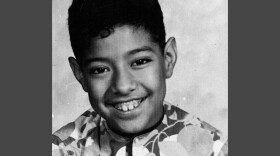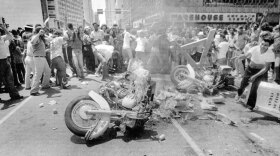Warning: This story includes details about a violent act against a child.
A line of cars was greeted with traditional memorial mariachi songs as they arrived Saturday morning at Oakland Cemetery, where a ceremony honoring the life of Santos Rodriguez was taking place.

Bessie Rodriguez, Santos’ mother, was joined at the cemetery by community organizers and city leaders. She sat in the front row and listened to speakers talk about her son.
At the event, Dallas Police Chief Eddie Garcia addressed Bessie Rodriguez, first in Spanish then English.
"We must apologize as a police department — a department made up of mothers, fathers daughters and sons. On behalf of the Dallas Police Department, I am sorry,” he said.
Garcia emphasized there's more work to be done by the department.
"With more accountability, more transparency, more diversity in our academies, we were always going to continue to work,” he said. There is no end in sight. There is no finish line."

Garcia added hehopes this apology is a step toward building trust between Latino residents and Dallas police.
Organizers shared how Mexican American residents of Dallas are still healing from the tragic death.
"If any of you doubt that this is new, or they did only happen with Santos... No, it was not an isolated tragedy," Frances Rizo, a Mexican-American community activist said to the crowd. "What was different is that he was 12 years old, handcuffed in a squad car and Darrell Cain dared to play Russian Roulette with him."
A Glimpse Back At What Happened To The Young Brown Boy

On July 24, 1973, Santos Rodriguez and his 13-year-old brother David were pulled from their home, handcuffed and put inside a police car.
Two officers accused the Rodriguez brothers of stealing $8 from a cigarette vending machine at a nearby gas station. They denied the robbery.
Later, Officer Darrell L. Cain decided to play a game of Russian-roulette to force the boys to confess to the crime. He aimed the gun at the back of Santos’ head. He pulled the trigger the first time and nothing happened. The second time the gun fired and a bullet sped through Santos' temple. He died in that squad car and reports say his blood soaked his brother's feet.
Cain was convicted of murder and sentenced to five years but was released after two and a half years.

How Santos' Death United Dallas' Latino Community
Santos’ killing sparked protests and riots in the city.
Shortly after his death, thousands of people of Mexican descent marched and protested at city hall. They shouted “justicia” or in Spanish, "justice for the people."
Activists recall this moment as the first time in the city Mexican activists came together to fight for a cause. It created a significant shift in Dallas’ history. Latinos spoke out more publicly and activism turned into Latinos running for elected offices.
Warning: This clip contains the sound of a gunshot.
For some activists, not much has changed between brown and Black communities and law enforcement.
"Police brutality continues to exist. The key is that we continue to organize. In memory of him, we must reimagine public safety," said former Dallas City Council member Diane Ragsdale, who served from 1984 to 1991.
Ragsdale, an activist who worked with the Latino community to start the annual eventsaid one way Santos' memory lives on is by Black and brown communities in Dallas working together and uniting to address police brutality.

Got a tip? Alejandra Martinez is a Report For America corps member and writes about the impact of COVID-19 on underserved communities for KERA News. Email Alejandra at amartinez@kera.org. You can follow Alejandra on Twitter @alereports.
KERA News is made possible through the generosity of our members. If you find this reporting valuable, consider making a tax-deductible gift today. Thank you.






